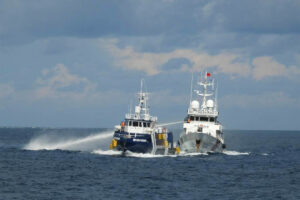Most Filipinos view the US as the Philippines’ most dependable ally in managing tensions with China in the South China Sea, a commissioned poll showed on Wednesday, amid growing concerns over Beijing’s increasingly assertive maritime claims.
About 77% of respondents said the US is the “top country capable of helping the Philippines manage Chinese provocations and safeguard its maritime rights,” according to nongovernment group We Protect our Seas (WPS), which commissioned Pulse Asia Research, Inc. to conduct the survey.
The pollster interviewed 1,200 Filipinos on Sept. 27-30 for the survey, which had a ±2.8% error margin.
Trust in Washington as a security ally led across all major island groups, with support highest in Metro Manila at 82%, followed by Luzon (81%), the Visayas (77%) and Mindanao (65%).
“The result reflects the enduring strength of the Philippine-US alliance and widespread public confidence in Washington’s role in maintaining regional stability and upholding international law in the South China Sea,” WPS said in a statement.
The Chinese Embassy In Manila did not immediately reply to a Viber message seeking comment.
Manila and Washington maintain a defense partnership anchored on a 1950s Mutual Defense Treaty that binds both to defend one another in case of an armed attack.
Relations between the Philippines and the US have strengthened under President Ferdinand R. Marcos, Jr., whose administration has taken a tougher stance against China’s sweeping claims in the South China Sea.
He expanded the number of sites for joint military use with Washington, including bases near strategic flashpoints in the contested waterway and close to Taiwan.
Beijing claims nearly all of the South China Sea via a U-shaped, 1940s nine-dash line map that overlaps with the exclusive waters of the Philippines and neighbors like Vietnam and Malaysia despite a 2016 ruling by the Permanent Court of Arbitration in The Hague that voided its claims.
China refuses to recognize the ruling and has continued to deploy an armada of vessels in the disputed waters, leading to maritime confrontations with Manila.
The poll showed that 45% of Filipinos trust Japan, ranking it second after the US. Australia followed at 30%, then Canada (29%) and the UK (25%).
Other countries cited in the poll include South Korea, trusted by 22% of respondents, followed by Germany (17%), France (10%) and India (3%).
The group said the results suggest that the public is aware of the Philippines’ growing security partnerships with the countries in the South China Sea, reflecting support for a multilateral approach to regional stability.
“The survey underscores that Filipinos clearly recognize the importance of working with like-minded democracies to defend the country’s sovereign rights and sustain a rules-based maritime order,” WPS President Jeffrey Ordaniel said in the statement.
“Strong public confidence in the United States — our sole treaty ally — and the favorable perception towards partners such as Japan, Australia and Canada demonstrate a deepening awareness that international cooperation, credible deterrence and transparency — not silence or appeasement – are vital to countering Beijing’s aggression and coercive activities in the West Philippine Sea,” he added, referring to parts of the waterway within Manila’s 200-nautical mile exclusive economic zone.
The Philippines, already bound by military agreements with the US, Japan and Australia, is pursuing closer security ties with other nations amid boiling tensions with Beijing over disputed features in the South China Sea. — Kenneth Christiane L. Basilio
